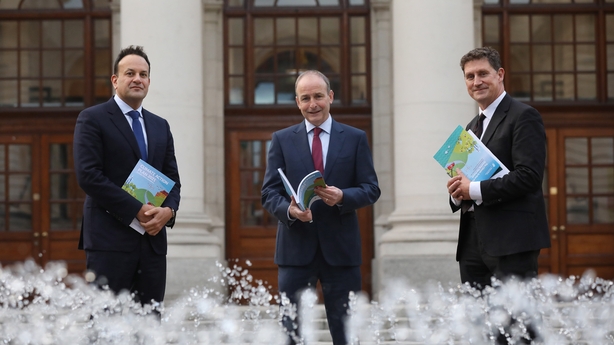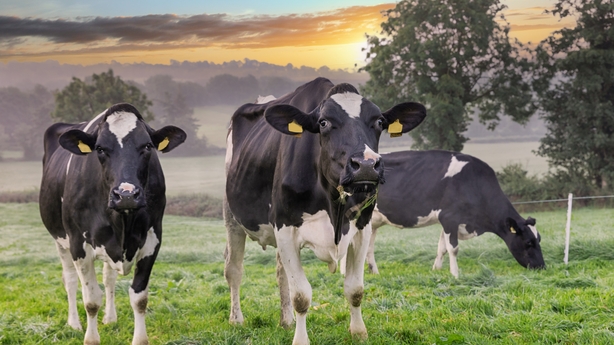Ireland is no longest considered a climate laggard but it is not a leader yet, according to the Tánaiste.
Speaking on Morning Ireland, Leo Varadkar said Ireland is one of the highest per capita emitters in the world.
"Ireland is a small country, we're only five million people, but if you divide the number of greenhouse gases we emit, by the number of people in the country, we’re actually one of the highest emitters in the world. We have a duty to do our part to bring our emissions down," he said.
Mr Varadkar said that anyone who doubted climate change cannot do so any more, due to "the fires, the floods, the milder winters, the warmer summers and the shocking biodiversity loss".
He said the measures in the Climate Action Plan, published yesterday, are changes that we have to make and they will give us a better and healthier society.
The Tánaiste said there will be a lot of public investment in energy grid and public transport and that many businesses are eager to invest in renewable energy.
He said that people are worried about the impact of climate action on them and the impact on their job, their business, the cost of living and whether they can still go on holiday abroad.
Mr Varadkar said this plan is not about coersion, but rather about convincing people.
He said the target of one milion electric vehicles on the road by 2030 is possible to meet.
Mr Varadkar said he thinks Ireland can hit the target, but it will take concerted action by Government and others.
He said there will be incentives to buy an electric vehicle
"We see in the last year or so, that about 15% of cars being bought are electric. That’s a big increase on virtually none only a few years ago," he said.
New technology can take off really quickly, he said, referencing mobile phones.
Mr Varadkar said cost of charging an electric vehicle is a fraction of filling a car with petrol and diesel.
Read more:
Plan to reduce greenhouse gas emissions published
Climate change failure 'simply not an option'
Ireland's move towards renewable energy as outlined in the Climate Action Plan will be better for the economy as well as the environment, he said.
The Tánaiste said imported fuels such as oil, gas and coal, come from places like Russia and the Middle East, so renewables will be better value for money, since Ireland can set the cost.
"The vision is that in 20- or 30-years' time, we will produce a huge amount of offshore wind. We’ll use the excess wind to produce hydrogen, which is an alternative energy that could be used to fuel trucks," he said.
"Instead of importing all that oil and coal and gas, we’ll have our own indigenous source of energy, there’ll be much more stability on price, since we will essentially be able to set the price. We’ll have more security and supply," he added.
"This makes economic sense as well. It’s not just about doing the right thing by the environment," Mr Varadkar said.

The Fine Gael leader said that the country had "virtually no renewables not that long ago" and Ireland's move towards renewables is an "an enormous achievement".
He said that planning laws for wind farms are being changed and that a new body, called MARA, will licence offshore wind once it is established.
He said with that this legislation should be through by Christmas and the regulator should be set up next year.
Mr Varadkar said a systems change is needed to tackle climate change.
"We shut down the economy and most people stayed at home for a year and emissions only went down by about 10%," he said.
"Is it going to take a generation to make those changes that need to be made? Yes, but we’re going to do the heavy lifting in the next 10 years," he said.

Farmers 'scared' for livelihoods
The chair of the Women in Agriculture Stakeholders group has said that many farmers are "really scared" for their livelihoods.
Hannah Quinn Mulligan, who is also a suckler farmer, said measures are good "on paper", but that farmers need to see that it is going to add up for them as well.
"We always knew that this was coming. There are a lot of farmers out there who always knew that these climate measures were coming, and yet they feel very sudden and I'm annoyed at that in a way, because no solutions have been provided really, while at the same time they say that we need to cut emissions," she said.
"If you take into account, that the average farmer is 57-years-old, if you turn around to any 57-year-old and say: 'Okay, now you have to change completely what you’re doing’, it’s going to scare them," she added.
"There are a lot of farmers out there who are really scared and really scared for their livelihoods. It’s just unfair," she said.
Ms Quinn Mulligan added that there are 70,000 women currently working in agriculture who are "not recognised".
The Tánaiste said that "climate-shaming" of farmers should stop.
There was an increase in agriculture emissions last year, but decrease the year before, Mr Varadkar said.
"We're determined to bring farmers and rural communities with us when it comes to making this change," he said.
"What we now have is certainty for farmers. We have a climate plan. They know exactly what they have been asked to do," he said.
Dr Cara Augustenborg, a member of Climate Change Advisory Council, said the Government needs to do more to support farmers to reduce emissions.
Speaking on RTÉ's Today with Claire Byrne, Dr Augustenborg said there is a need for schemes to help support farmers to move away from intensive dairy and beef into more diverse farming practices that also allow them to continue earning a living.
"I will say that, surprisingly, I actually agree with the IFA sentiment on their planned protest in November, which is that they have said they're willing to work with the Government to address the emissions issue," she said.
"But they need supports and they need a detailed plan and that is what we urgently need to see next," she said.
She said that some new technology can play a role in reducing emissions, but it can be expensive for farmers.
"The most notable being slurry spreading technology, which has a big impact on emissions, but unfortunately is a very expensive technology for farmers.
"The assumption is that we're going to roll out all of these measures when in fact no one has actually explained who is going to pay for these more costly measures that farmers will be expected to implement."


